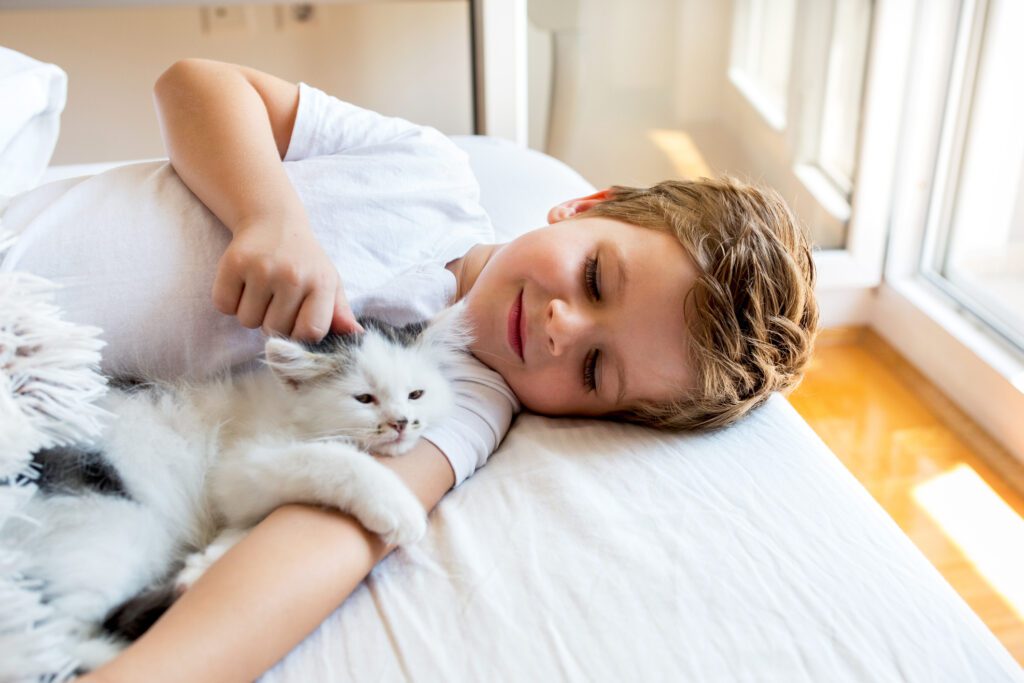Children and Pet Loss

After a beloved pet dies, we find it hard to accept; but what about young children? How do we explain the death of a pet and help them deal with the reality and emotions?
This can be a very sensitive issue and should be handled with care and honesty. Since children’s emotional maturity and imagination change from one age to another, it is important to handle the subject of death appropriately for each age. In this article we provide some suggestions and helpful hints how to handle this.
Be Honest
First and foremost, at what ever age, tell your children the truth. According to Marty Tously, a bereavement counselor for the Pet Grief Support Service, “Honesty is the best policy…this means using the actual words — death and dying.”
She goes onto to explain that it’s ok to explain the permanence of death, but do it gently and try not to confuse what dying actually means.” It’s important for you to know where your child’s mental maturity and cognitive development is at, because this plays a large role in how you explain the process of death and words you choose to use.
For example, in an article written by Alex Lieber “Explaining Pet Loss to Children – The 6’s Do’s and Don’ts” she reports that Tously recommends the following guidelines:
- Under 2: A child can feel and respond to a pet’s death, based on the reaction of those around him or her, and picks up the stress felt by family members
- 2 to 5: The child will miss the animal as a playmate, but not necessarily as a love object. They will see death as a temporary state, and may regress in their behavior (e.g., thumb sucking).
- 5 to 9: Children begin to perceive death as permanent, but they may indulge in “magical thinking,” believing that death can be defied or bargained with. This is also the period when children recognize a correlation between what they think and what actually happens.
- 10 and up: Children generally understand that all living things will eventually die, and that death is total. Understanding and accepting are two different things, however. They may go through the normal stages of grief that grownups do: denial, bargaining, anger, guilt, depression and acceptance.
When it comes to the actual “Dos and Don’ts”, the number one “don’t” is do not lie. Using phrases like “fluffy went away” or “fluffy was put to sleep” can cause resentment and confusion.
These euphemisms can also cause traumatic anxiety in a child. To use the example of “fluffy was put to sleep”, a child may suffer from a sleep anxiety due to the thought that the same thing might happen to them.
The Dos and Don’ts
Here are Tously’s 6 “Dos and Don’ts” taken from Alex Lieber’s article: “Explaining Pet Loss to Children – The 6’s Do’s and Don’ts”
- Be open and honest. This includes the pet’s health and euthanasia. The child needs to be told as soon as possible by the parent. Some children want to be present during euthanasia and most will be very curious about the process. You should answer their questions during this time. Some veterinarians are firmly against it having children present; but others say it depends on the child’s age and maturity. A veterinarian can help the parent explain why euthanasia may be the most humane option, and answer any questions a child may have.
- Make sure the child understands what “dying” means. Explain that the animal’s body stopped working. It is important for the child to know that the pet has died and will not be coming back.
- Be available to let your child discuss his/her feelings about what happened. You may want to hold your own service to memorialize the pet and to say goodbye formally. Some people may spread the pet’s ashes after cremation or plant trees in a special spot. Others bury the pet in a cemetery so the family can visit. Encourage your child to show his/her feelings by talking or writing about the fun times they had with their pet.
- Show your own feelings. This tells the child that the pet was special and that they are not grieving alone. You can also encourage your child to open up, which can help the healing process.
- Tell your child’s teachers about the loss, so they will understand why your child is behaving differently.
- Don’t blame the veterinarian. Some parents, especially those who fear explaining euthanasia to their children, find it easier to lay it all on the vet. This is not only unfair to the veterinarian, but potentially harmful to the child. He or she may grow up distrusting veterinarians and, by extension, doctors and other medical professionals.
Give Some Time
The last thing to remember is that we as parents, grandparents, and friends should not try to ease the child’s pain by immediately buying another pet. Give your child some time; they are much more resilient than we give them credit for. We also don’t want the child to think that the pet, who is a member of our family, is so quickly replaceable.
Remember that grief affects us all differently. Give your child time to honor, remember, and mourn their friend/family member. This is a sensitive time for all involved.
Helpful Hands
There are many helpful resources out there to help you, your children and family through this difficult time. The best resources can be found online searching for “pet loss support groups near me”. There are also many articles, videos and books on the subject. If you live in Reno, Nevada or Lake Tahoe Region, CA – here are some helpful links to organizations who can help.
- Pet Loss Resources
- Clover Counseling – Pet Loss Counseling in Reno, NV
- Human Society of Truckee/Lake Tahoe – Pet Support Group
If your pet is nearing his/her end of life, please call Forever Companion. Forever Companion offers a compassionate and holistic approach to your family pet’s end of life care at your home in the presence of loved ones.
Services offered:
- Pre-planning consultations
- Hospice care
- At-home euthanasia services
- Options for pet cremation, memorialization and transportation.
Their experienced veterinarian and vet tech duo serve the greater areas of Reno and Carson City; as well as Lake Tahoe and surrounding areas.

